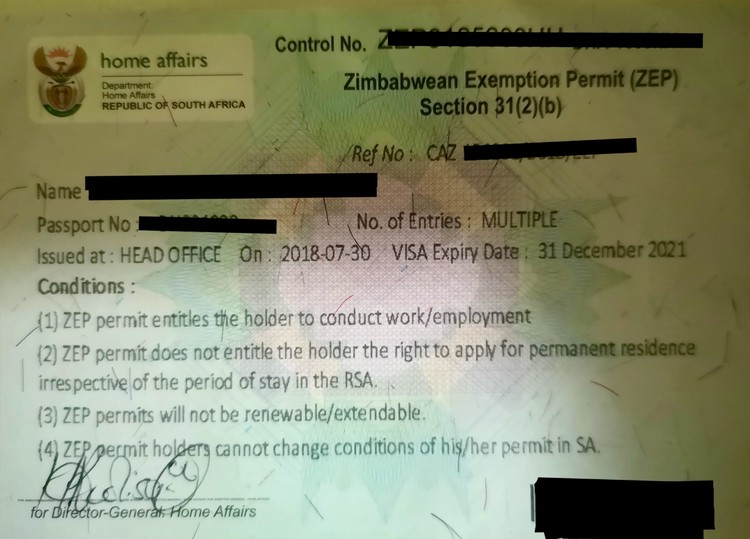Home Affairs extends validity of Zimbabwean permits by another six months
Zimbabwean Exemption Permits will now expire in December
Many Zimbabweans have been legally in South Africa since 2009 through a series a permits. After 2017, the Zimbabwean Special Permit was replaced with the Zimbabwean Exemption Permit (ZEP, pictured above). In 2021, Home Affairs Minister Aaron Motsoaledi announced that the ZEP system would not be renewed. It has now been extended to 31 December 2023. Photo: Tariro Washinyira
-
The Zimbabwean Exemption Permit has been extended until 31 December 2023. It was due to expire at the end of June.
-
Hundreds of thousands of Zimbabweans faced deportation while judgement on a civil society court challenge has been outstanding since April.
-
The Department of Home Affairs has been dealing with up to 1,500 waiver applications from Zimbabweans per day.
Zimbabwean Exemption Permits have been extended for a further six months, until 31 December 2023, the Department of Home Affairs announced on Wednesday.
The extension affects about 180,000 permit holders who faced deportation if they cannot find alternative legal permission to live in South Africa.
In November 2021, Cabinet announced it would no longer extend the validity of Zimbabwean Extension Permits (ZEP) which were set to expire in December 2021, but granted a 12-month grace period until December 2022.
This was then extended to June 2023 in order to give people time to apply for other visas to remain in South Africa. It has now been extended by another six months.
Organisations, including the Zimbabwean Exemption Permit Holders Association (ZEPHA), the Helen Suzman Foundation (HSF), and the Zimbabwean Immigration Federation initiated court action against Home Affairs Minister Aaron Motsoaledi in a bid to overturn the decision to scrap the ZEP. Other groups supporting litigation include the Consortium for Refugees and Migrants in South Africa (CORMSA) and the Scalabrini Centre.
In April, the Pretoria High Court reserved judgment on the matter.
On Wednesday Home Affairs stated: “The Minister took into consideration the said factors, including (to a certain extent) submissions received from the affected Zimbabwean nationals, relevant officials of Home Affairs and other interested parties and decided to issue another Immigration Directive, extending the validity of Zimbabwean Exemption Permits for a further period of six months, ending on 31 December 2023.”
Home Affairs stated the minister had approved “thousands of waiver applications” from affected Zimbabwean nationals.
Between 1,000 and 1,500 visa and waiver applications were being received per day, leading the director-general to deploy more officials to assist in processing the applications, Home Affairs said.
“The Minister’s Immigration Directive no: 2 of 2023, will be published in the Extraordinary Government Gazette tomorrow on Thursday, 8 June 2023. The Minister calls upon all interested parties to take into consideration the said Directive in their decision-making processes.”
The directive states: “No holder of valid exemption permit may be arrested, ordered to depart or be detained for purposes of deportation or deported in terms of the section 34 of the Immigration Act for any reason related to him or her not having any valid exemption certificate (permit label/sticker) in his or her passport. The holder of a valid exemption permit may not be dealt with in terms of sections 29, 30 and 32 of the immigration Act.”
“No holder of exemption permit should be required to produce a valid exemption certificate or permit and an authorisation letter to remain in the Republic contemplated in section 32(2) of the immigration Act when making an application for any category of the visas, including temporary residence visa.”
In 2009, the South African government introduced a Dispensation of Zimbabwean Permit (DZP) to legalise the many Zimbabwean nationals already living and working in South Africa. Zimbabweans who had applied for asylum were encouraged to apply for a DZP.
About 295,000 Zimbabweans applied and about 245,000 permits were issued. The DZP was valid for four years. In 2014, the DZP was renamed the Zimbabwe Special Permit (ZSP), and in 2017 was changed to the Zimbabwe Exemption Permit (ZEP).
Sharon Ekambaram, manager for Lawyers for Human Rights’s refugee and migrants program, said that her organisation wrote a letter to the Minister on 26 May 2023 pointing out that the cancellation of the ZEP has placed enormous stress on people who remain uncertain about their future here in South Africa.
“We pointed out that the sudden announcement of the intended cancellation by Home Affairs has created an imminent humanitarian crisis for them. Currently, three cases are before the South African High Court challenging the proposed cancellation for various rights infringements, including the ZEP holders’ socio-economic rights and dignity.”
“Repeated short extensions expose the contempt that the department has for the thousands of people’s lives affected by a policy change that was not informed by any rationale or consideration of its impact. The Minister should withdraw completely its decision to cancel the ZEP,” Ekambaram said.
© 2023 GroundUp. This article is licensed under a Creative Commons Attribution-NoDerivatives 4.0 International License.
You may republish this article, so long as you credit the authors and GroundUp, and do not change the text. Please include a link back to the original article.
We put an invisible pixel in the article so that we can count traffic to republishers. All analytics tools are solely on our servers. We do not give our logs to any third party. Logs are deleted after two weeks. We do not use any IP address identifying information except to count regional traffic. We are solely interested in counting hits, not tracking users. If you republish, please do not delete the invisible pixel.



